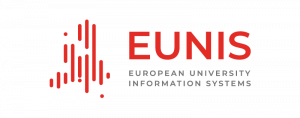Minutes of the board of Directors
14th-15th November 1994, Düsseldorf, Germany
Present:
Bruno Paternostre (Belgium)
Kristel Sarlin (Finland)
Yves Epelboin (France)
Jan Knop (Germany)
John Moriarty (Ireland)
Edgar Frackman (Germany)
Jean FranTauois Descloux (Switzerland)
Mike Collin (UK)
John Heap (UK)
Robin McDonough (UK)
Solke Veling (Netherlands)
1. Report
The meeting accepted the minutes of the meeting held in London on 26/27 April 1994.
2. Networking Report
The final comments on this report had been sent to Kristel Sarlin for inclusion.
3. EUNIS flier
The contents of the flier were considered in French, German and English. John Heap provided a number of different options for the logo for EUNIS. One of these was chosen by the meeting and this will be included in the flier. Jan Knop agreed to organise the printing and distribution of the flier.
4. Administrative Computing Survey
Chris Hendriks was unable to attend the meeting. However, he had circulated a report entitled “Survey of projects on administrative computing”. This was based on responses from seven countries.
Two conclusions were drawn:-
(i) There are a number of countries in which application software is developed and maintained by consortia of universities. The general picture is that this structure works well as long as there is a substantial financial input from the government.
(ii) Projects focused on the development of an electronic counter are very limited (although there might be local projects run by individual universities).
With the necessary care one might say that institutes are soon going to be confronted with the need to supply administrative information to a broader audience. The culture is changing in such a way that people want to get access to data electronically and no longer take technical constraints as an excuse for not getting it.
There are two reasons to give special attention to this development.
(a) With the increasing importance of integrating external data with internal data, setting up national projects in this field would be sensible.
(b) Institutes will have to develop a more elaborated infrastructure in order to meet the new requirements (integrated and user-friendly access to information independent of place and time).
Since the challenges we are going to face will be quite similar to all of us, it was recommended to take ‘the electronic counter’ as one of the themes of next year’s EUNIS conference.
5. Software Survey
Robin McDonough tabled a report which he and Mike Johnston from CHEST had compiled from the survey which had been carried out. As expected, it was difficult to compare the replies from different countries although it was possible to identify some products as being particularly expensive in certain countries.
6. Proposed Structure for EUNIS Information
Yves Epelboin proposed a structure for a EUNIS WWW server.
- Establish a base for a EUNIS WWW server
- Establish a base for a EUNIS WWW server
- Welcome page
- Basic information about EUNIS
- Activities
- Meetings (short summaries of board meeting)
- Congress
- Publications (possibility to retrieve them through FTP anonymous)
- Pointers to National Servers for EUNIS members Each national WWW server should provide:
- National member policy and activity both in own language and English
- pointer(s) to other national services of interest
- EUNIS news
- EUNIS open distribution list
- EUNIS archives
The idea is that each country is solely responsible for the information provided to the international community. EUNIS central server provides only the pointer to one national page, so that each country may easily modify and update the information.
The philosophy is the same for most local information. For instance the central server will provide a pointer to the document written by Kristel Sarlin on the networks in Europe. The document itself will be stored in Finland. The information about the Congress will be at Dusseldorf University and the central server will point to it.
7. Date of next meeting
It was agreed that the next meeting would be held in Louvain La Neuve, Belgium in May 1995.
Robin Mc Donough
